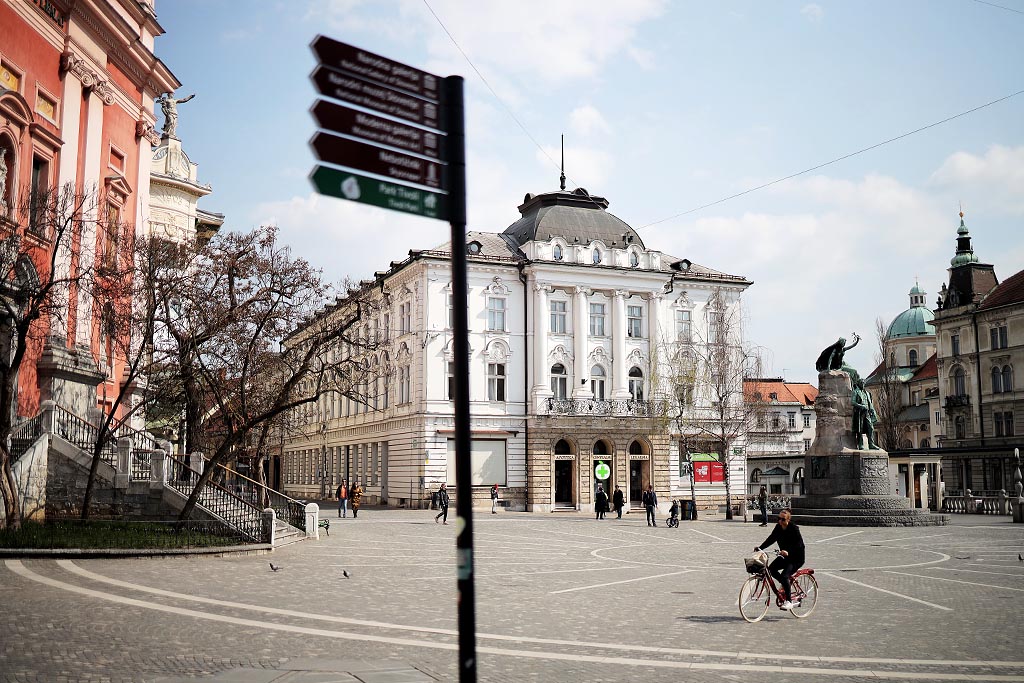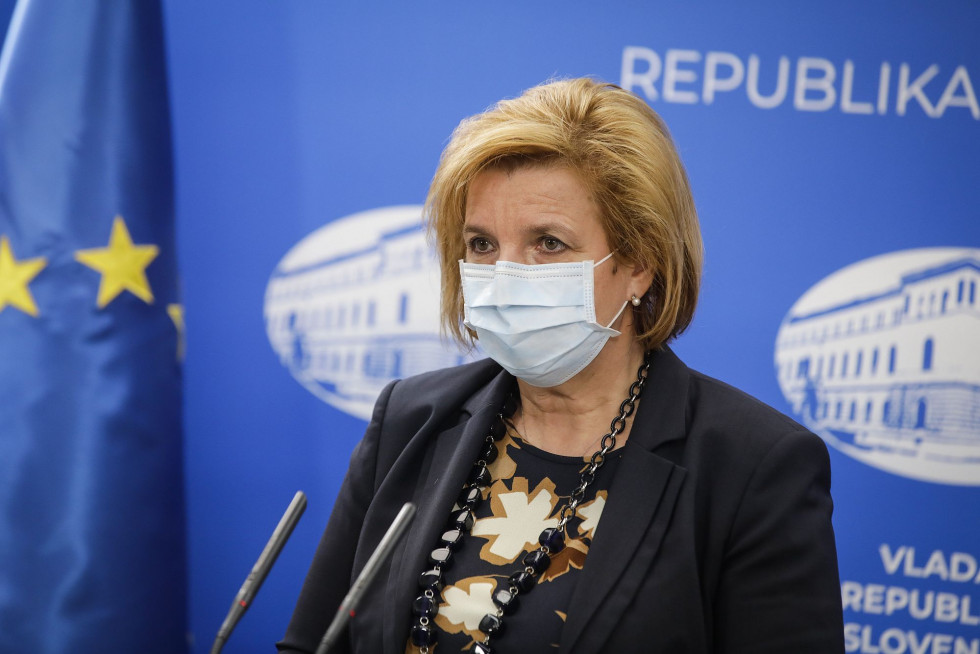By: gov.si
Yesterday’s press conference on the current situation with regard to COVID-19 was attended by Bojana Beović, head of the advisory group at the Ministry of Health, Deana Potza of the Health Inspectorate, and Deputy Director General of the Police Tomaž Pečjak.
4,958 PCR tests were conducted yesterday. 1,144 new cases were confirmed, with a positivity rate of 23%. 8,639 rapid tests were conducted yesterday. 371 new infections were confirmed. The positivity rate for rapid tests was 4.3%. A total of 13,597 tests were conducted, with 1,516 positive results. 1,106 patients are hospitalised due to coronavirus, 38 fewer than the previous day. 171 patients were in intensive care, 1 less than on Tuesday. Twenty three patients died.
Changes to the content of certain ordinances
Due to the worsening epidemiological conditions in the Coastal-Karst and Zasavje statistical regions, the individual exceptions that were introduced last week have been revoked in these two regions. This applies to the exceptions to the sale of goods and services, such as operation of cableway installations and provision of cultural and cinematography services. The changes will enter into force on 30 January and will apply until 5 February.
The Ordinance on the temporary suspension of the sale of goods and services to consumers in the Republic of Slovenia now permits additional sales of socks and underwear in the seven red regions: Central Slovenia, Podravje, Gorenjska, Koroška, Primorska-Notranjska, Pomurska and Savinjska.
The Government has also adopted decisions regarding the sale of goods and services directly to customers in the area of drivers and vehicles in Slovenia. This means that the activities listed in the ordinance can only be conducted on the condition that the persons that carry out activities in this area have been tested for the presence of SARS-CoV-2 (COVID-19) using the RAT or PCR methods. The same rule also applies to passengers who take part in the conducting of those activities.
Beović: COVID-19 mortality rate in Slovenia is low
The figures regarding the number of people hospitalised from nursing homes are changing, as these days they are accepting just 5 to 7 patients a day, while in the past months they were accepting from 30 to 40 a day. During the last few months this meant that a total of between 150 and 170 nursing home residents were hospitalised, while today this figure is 70.
Beović ascribes the fact that the falling curve of new Covid cases in Slovenia is not similar to the falling curves in other countries that have adopted similar measures to those adopted in Slovenia to the culture of the population or other circumstances that affect attitudes within society.
The COVID-19 mortality rate in Slovenia is low, which ranks it below the European average. This is a testament to the healthcare system at all levels, that patients have received appropriate treatment and have recovered.
The six hundred thousand people who have recovered from the virus and are now immune to it are also helping to stem the spread of the disease. There are difficulties with the manufacturing and supply of vaccines, but we are optimistic regarding the registration of the fourth vaccine from Johnson&Johnson, which is in the third and final round of clinical testing and should be available to the public by late spring. Vaccination will most likely have to be repeated once a year.
The Expert Group at the Ministry of Health has not released an opinion regarding the opening of schools in the two regions that have moved from the red phase into the black phase in the last few days. The issue is not a simple one, and the Group leaves the decision in the hands of the National Institute of Public Health (NIJZ), the ministry and the Government.
Contact tracing of Covid positive cases will have to be established as soon as possible, in part due to the appearance of increasing numbers of new and potentially more dangerous variants of the virus, and therefore the NIJZ will need to expand its staff. In cases where people contract Covid after receiving their first dose of vaccine, they may not receive vaccinations while they are ill, but must receive the second dose within six weeks of receiving the first dose.
Health Inspectorate inspects 52 vaccination locations
Deana Potza presented the weekly report on inspections related to the management of COVID-19 for the period from 18 to 24 January 2021. The total number of inspections carried out by all of the inspection bodies listed in Coronavirus Relief Package 7 was 3,740. Inspection bodies issued 34 minor offence sanctions, 335 warnings under the Minor Offences Act and 126 administrative measures. The Health Inspectorate conducted 1,047 inspections, and issued 9 minor offence sanctions under the Minor Offences Act, 70 warnings and 10 administrative measures. A total of 149 inspections were carried out in the hospitality sector, resulting in 5 minor offence sanctions and 9 warnings. It conducted 387 inspections in the other services sector and issued 4 minor offence sanctions under the Minor Offences Act, a total of 22 warnings, and 2 administrative decisions banning activities. The Health Inspectorate carried out 316 inspections in outdoor public areas, resulting in 30 warnings, and 195 inspections of multi-apartment buildings, resulting in a total of 16 warnings.
On Saturday and Sunday, health inspectors visited seven ski areas, where in addition to checking adherence to the hygiene recommendations of the National Institute of Public Health, they also checked the manner in which the operators were ensuring that their cableways and ski runs were being used only by people who had submitted a negative test for COVID-19. Rapid tests were provided on-site at three ski areas: Kope and Maribor and Ruše Pohorje.
In order to monitor vaccinations, the inspectorate collected the following data at 52 vaccination locations from the vaccination providers at the individual locations: (i) number of doses requested, (ii) number of doses received, (iii) number of vaccinations performed, (iv) the age and gender of vaccinated persons, and (v) the entry of the vaccinations in the Electronic Register of Vaccinated Persons and Side Effects Following Vaccination.
On the basis of the data received it was established that 51 of the providers were performing vaccinations in accordance with the national strategy. At the Nova Gorica Health Centre, it was found that persons had been vaccinated who were not in the priority groups pursuant to the strategy.
The Health Inspectorate found that up to 30 December 2020, when the use of just five doses per individual vial was mandated, vaccination providers made use of the sixth dose to varying degrees. Some providers reported difficulties in extracting individual doses of vaccine from the vials, and therefore were unable to make complete use of the vaccine that they received. From 31 December 2020 on, after the approval of the sixth dose of vaccine from the vials, the percentages of both extracted and used sixth doses increased.
A total of seven regulatory decisions were issued with regard to monitoring the performance of COVID-19 vaccination, at three general hospitals: Nova Gorica, Novo Mesto and Jesenice, and at four health care centres: Nova Gorica, Domžale, Velenje and Grosuplje.
Weekly report on police operations
Tomaž Pečjak presented the report on police activities relating to measures to prevent the spread of the COVID-19 epidemic in the past week, from Thursday, 21 January to Wednesday, 27 January 2021.
In the course of their inspections, police officers conducted inspections of 15,573 places in relation to the implementation of the provisions of Government ordinances, and issued a total of 1,315 measures (including 757 warnings, 521 penalty notices and a small number of expedited procedures). Procedures due to failure to obey a lawful order from a police officer were initiated in 26 cases, and the Health Inspectorate was notified of 11 violations.
In that period the police issued a total of 6,851 quarantine orders at border crossings and checkpoints. Thirty-three of these orders were cancelled when it emerged that the individuals involved were in possession of suitable evidence. Police officers have thus issued quarantine orders to 6,818 people in the last seven days.
As regards the number of quarantine orders per point of entry, the largest number of quarantine orders were issued at the borders with Croatia (6,287), Austria (371), Hungary (62) and Italy (50). A further 48 quarantine orders were issued to passengers landing at Ljubljana Jože Pučnik Airport.
In terms of country of departure, the largest numbers were issued to individuals travelling from Bosnia and Herzegovina (4,297), followed by Kosovo (813), Croatia (458), Serbia (355), North Macedonia (323) and Germany (209). Quarantine orders were issued to individuals travelling to Slovenia from a total of 39 different countries.


